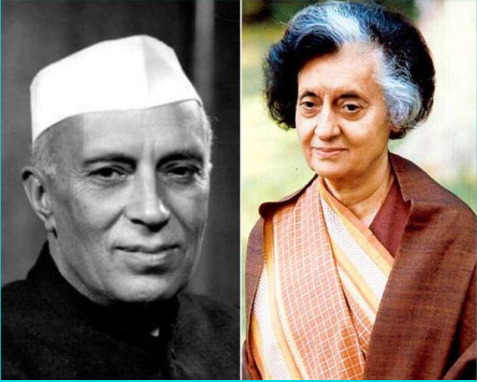Independent India’s first Prime Minister Jawaharlal Nehru’s tenure was not less than a disaster for India’s economy and bureaucracy. Nehru was entrusted with the job of steering India away from the shackles of poverty and misery. Instead, the Nehrus and the Gandhis turned India into a nauseating Kleptocracy.
Nehru rose to power at the behest of Mahatma Gandhi, and was peculiarly enticed by the Soviets. Immediately after assuming power, he went full steam ahead to establish a Soviet-inspired model of governance in India. Nehru’s political adventurism therefore kept India clear of the pro-development or the capitalistic policies.
India’s political economy has always been tilted towards the privatisation of entities. Given the fact that India was the world’s largest economy for more than two-thirds of the known global history, one can argue that this model of political economy ran pretty successfully until India in the modern era became a democracy and subsequent prime ministers like Jawaharlal Nehru and Indira Gandhi pushed for the nationalisation of institutions.
Nehru once infamously said to JRD Tata that he hates “the very mention of the word profit” and subsequently he made profit making a taboo in the country.
Among Nehru’s other illustrious legacies, which the subsequent Congress leaders and especially his own family members religiously followed, are the number of scams and crony capitalism which flourished under his rule. Nehru’s rule was marred with many scams. To begin with, as India gained independence and even before when India became a republic, the plundering of the nation through scams was started by the Congress under the tutelage of Jawaharlal Nehru.
The Jeep scam, Haridas Mundhra Scandal, Pratap Singh Kairon Scam and Teja Loan Corruption Scandal were a few among the many scandals that rocked our country under his rule, and were seemingly facilitated by the Nehru administration.
The Nehruvian economic strategy was based on four broad principals. The first being that capital accumulation is very difficult for a poor country and adopting modern technology of industrial revolution is much more difficult. The second was that accumulation of capital is dependent of domestic savings. The third was that government could play a major role in industrialization; the rationale for this thought came from rapid industrial development in Soviet Union in early years of Communist rule. The fourth principal was minimization of foreign trade, exports were not encouraged and all the capital was invested in import substitution.
Read More: Did Corruption Culture in Congress start under Nehru’s reign?
This was the foremost reason for successive balance of payments crisis faced by the country because the country was dependent at the mercy of foreign trade for financing essential imports. In fact, former prime minister of India, Manmohan Singh himself pointed this out as a flaw of Nehurvian economic policy in 1963.
Despite all of his misdeeds, Nehru was still a saint compared to Indira Gandhi when it came to apathy towards private businesses and profitmaking. From bank nationalisation to selling bread, butter, and sugar by the public sector units, Indira Gandhi took state intervention in the economy to new heights and completely muzzled the spirit of the entrepreneurs of the country.
Five decades ago, Congress reportedly took the first step in ruining the economy of the country to win elections and that was the nationalisation of each and every bank in the country at the time, drifting away from the idea of privatisation. The party performed poorly in the 1967 general elections and lost command in many states.
At the time, the High Command set up a committee to review the performance of the party and look after the reasons behind the loss. The review committee concluded that slow progress towards ‘socialism’ is the reason behind the loss of the party, and hence Congress decided to pursue a radical approach towards pursuing socialism, just like Stalin and Mao.
Indira Gandhi started from bank nationalisation and wanted to go up to nationalisation of all institutions (which she could not do due to vehement opposition from farm leaders like Chaudhary Charan Singh).
Morarji Desai, the then finance minister, and Deputy Prime Minister was sacked by Indira Gandhi without any prior notice. Desai was reform-minded and Gandhi knew that he would resist the nationalisation of banks.
A leader as authoritarian as Indira Gandhi obviously did not like independent-minded leaders. After Desai was removed, the decision of nationalisation of every privatised bank was implemented on July 9, 1969. At that time, these banks controlled 85 per cent of total deposits and therefore practically the whole banking sector came under government control.
Almost two decades after the pure Marxist onslaught on the economy began, the nation remained poor and while reviewing the lack of economic growth despite pursuing the ‘right path’, establishment economists like Krishna Raj concluded that this is a ‘Hindu rate of growth,’ which means that the problem is not with the design of the political economy but the Hindu culture of the country which hinders the economic growth.
Read More: Nehru’s rule: A nightmare from which the country is still recovering
The tyranny continued to sail further under the successive Congress or UPA led governments. The Congress party has been indulged in serious corruption scandals and scams since long. Considering Rahul Gandhi’s so-far sailing in the political arena, one can precisely conclude that the apple has not fallen far from the tree. Congress party’s modern image has become associated with corruption scandals, broken promises and a lack of vision.
From Agusta to the National Herald case, Rahul Gandhi has been implicated in various corruption allegations and the courts have been giving him tough time of late. Jawaharlal Nehru would be glad to know that his family members have adhered to his teachings and have only expanded upon his work.
